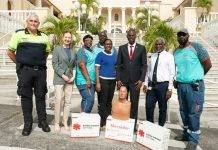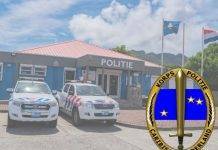GREAT BAY, Sint Maarten (DCOMM) – In advance of World AIDS Day, 1st December, the World Health Organization (WHO) has released new guidelines on HIV self-testing to improve access to and uptake of HIV diagnosis.
According to a new WHO progress report, lack of an HIV diagnosis is a major obstacle to implementing the Organization’s recommendation that everyone with HIV should be offered antiretroviral therapy (ART).
The report reveals that more than 18 million people with HIV are currently taking ART, and a similar number is still unable to access treatment, the majority of which are unaware of their HIV positive status.
Today, 40% of all people with HIV (over 14 million) remain unaware of their status. Many of these are people at higher risk of HIV infection who often find it difficult to access existing testing services.
HIV self-testing means people can use oral fluid or blood- finger-pricks to discover their status in a private and convenient setting.
Results are ready within 20 minutes or less. Those with positive results are advised to seek confirmatory tests at health clinics. WHO recommends they receive information and links to counselling as well as rapid referral to prevention, treatment and care services.
HIV self-testing is a way to reach more people with undiagnosed HIV and represents a step forward to empower individuals, diagnose people earlier before they become sick, bring services closer to where people live, and create demand for HIV testing. This is particularly important for those people facing barriers to accessing existing services.
Between 2005 and 2015 the proportion of people with HIV learning of their status increased from 12% to 60% globally. This increase in HIV testing uptake worldwide has led to more than 80% of all people diagnosed with HIV receiving ART.
The Pan American Health Organization (PAHO) theme for World AIDS Day 2016 which will be observed around the globe on December 1st is, “Take the challenge, end AIDS.”
The Collective Preventive Services (CPS), a government department under the Ministry of Public Health, Social Development and Labour, calls on the Sint Maarten community to prevent HIV infections and AIDS-related deaths and to eliminate HIV-related stigma and discrimination.
The aforementioned information is being shared as part of CPSs annual calendar of public health observances with the objective of increasing awareness, education in order for the community to have a greater understanding of HIV as a global public health issue.
CPS joins public health agencies and private sector organizations around the globe in working together to reach the global goals to end the epidemic by 2030.
The St. Maarten AIDS Foundation uses the Insti Human Immune-deficiency Virus (HIV) tests which involve only a small finger prick, with results available within 15 minutes.
All information collected is treated as confidential and throughout the process the person being tested remains anonymous. The St. Maarten AIDS Foundation, with its secretariat in the Sun Building across from Tropicana Casino in Cole Bay, offers HIV/STI prevention education outreach, care/treatment support for persons living with HIV/ AIDS and free HIV testing.
The AIDS Foundation has an average of 30 to 40 persons per month walking into their office to get tested. The foundation also hosts about six community outreach events that usually attract large crowds of persons requesting to get tested.
This year the St. Maarten AIDS Foundation is on track to break their testing record, which shows that more and more persons are realizing the importance of getting tested and knowing their status.
The focus on HIV combination prevention, early detection and access to antiretroviral treatment is key to end HIV transmission in coming years.
To achieve this objective, governments, health service providers, international organizations, civil society organizations, people living with HIV, key populations and other stakeholders should work together to Fast Track the response to HIV.
For information you can call CPS 542-2078 or 542-3003.






























